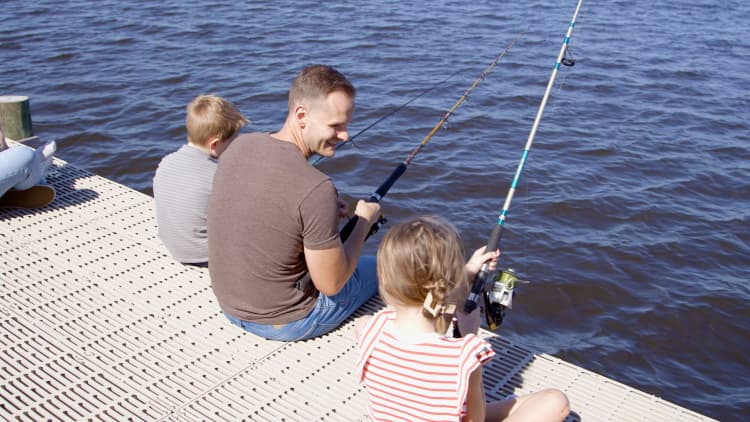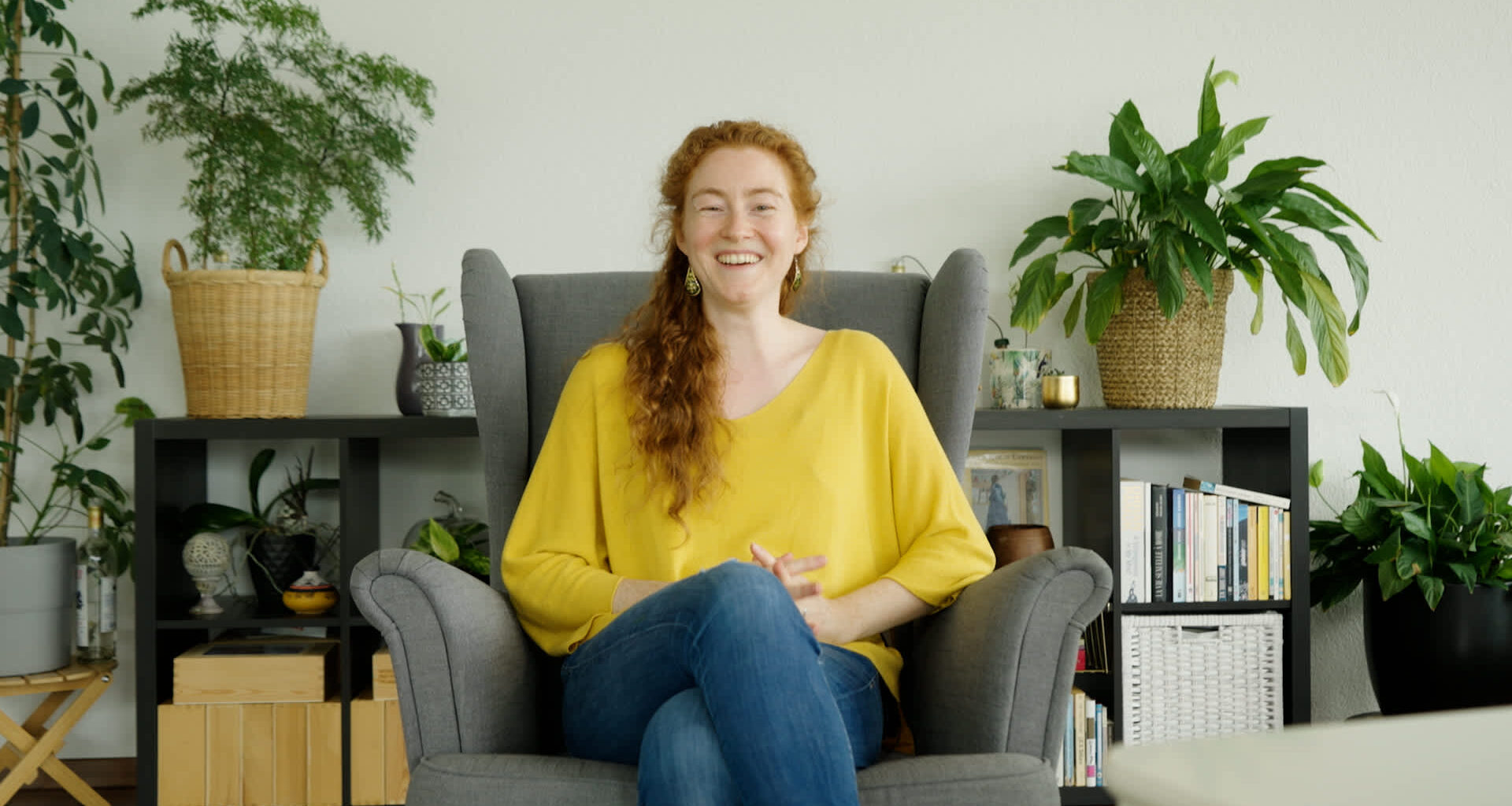This story is part of CNBC Make It’s Millennial Money series, which details how people around the world earn, spend and save their money.
On Valentine’s Day in 2024, Florence Poirel poured champagne in her Zurich apartment with her partner, both longtime Googlers.
Her partner, Jan, had just finished a long, stressful day, and their conversation turned to what life might be like if they stopped working altogether.
What began as a joke became serious the more they talked, Poirel tells CNBC Make It: “Wouldn’t it be great if we were retired? Why don’t we just do it? Why not just [take] that next step?”
By the end of the night, they had decided to go for it.
Florence Poirel with her partner, Jan.
Gabriel Pecot | CNBC Make It
At the time, Poirel was 35 and earning roughly $390,000 a year working for Google in Switzerland. Walking away from that kind of compensation might seem surprising, especially since she lives in one of the most expensive countries in the world. “Saying no to this kind of income can be daunting, for sure,” Poirel says.
But early retirement had been on her mind for years, having built up $1.5 million in savings and investments, as of January 2024, by setting aside most of her income each month. Describing herself as “risk averse” by nature, Poirel chose to test the waters with what she calls “a mini retirement,” with enough cash to cover 18 months of expenses.
Now, 18 months later, she hasn’t decided when she’ll return to work. Days are slower, spent reading, swimming in Lake Zurich or traveling with her partner to places like Brazil and Australia.
“I thought I would get bored very easily,” the now-37-year-old says. “But now, it’s been a year and a half and I still haven’t [had] a time of boredom.”
From Google promotions to planning an early exit
In 2013, after completing a master’s degree in business and economics, Poirel was working in marketing in Belgium. During a ride home at the end of a long week, she told a colleague how unfulfilled she felt with her job. He replied with the French phrase “qui ne tente rien n’a rien” — he who risks nothing has nothing.
The words stuck with her. The following Monday, Poirel quit her job. About a month later, she packed her things and moved to Dublin with no job lined up, choosing the city for its reputation as a tech hub. Within the year, she landed a contract position at Google, working in content moderation and safety.
Florence Poirel in her home office.
Gabriel Pecot | CNBC Make It
In 2017, she transferred to Google’s Zurich office to work as a project manager, where she earned three promotions over the following years. That’s where she met Jan, who is 17 years older. The relationship made her start to rethink her long-term plans — especially the idea of waiting decades to retire.
“I realized that I could not just wait for retirement to enjoy my time with him because he would be much older at that time,” she says. “So that’s when I thought, ‘OK, now I need to think about how I can retire earlier.'”
Discovering FIRE and going on ‘mini retirement’
Faced with the prospect of working decades longer than her partner, Poirel went looking for a way to retire sooner. “I think I literally typed in Google, how can I retire 17 years earlier,” she says.
That search led her to the FIRE movement, which stands for financial independence, retire early. It gave her both the structure and motivation to start tracking her net worth with a concrete target in mind. She began actively managing her investments using a detailed Excel spreadsheet and sought out promotions to boost her salary, channeling each raise directly into savings.
Florence Poirel walking the shore of Lake Zürich.
Gabriel Pecot | CNBC Make It
“People think FIRE is about eating only pasta or cramming into an apartment with 20 flatmates, but that was never my approach,” she says. “It never felt like deprivation … it was just how I behaved and how I shopped.”
By January 2024, she had put away about $1.5 million, and though she wasn’t burned out or unhappy at Google, she had already started preparing for life beyond work.
“I realized how much time with the people I love is the most important,” she says. “Climbing the ladder would have meant more responsibilities, more stress, late meetings — and financially, I didn’t need that anymore.”
Poirel and her partner keep their finances separate, splitting shared expenses proportionally — about 35% for her and 65% for him. The split was originally tied to their incomes, but has remained in place since they left their jobs.
“We’re not married, we don’t have joint accounts … having separate finances is very important to keep that independence,” she says. “Finances and money is never a stressor in our relationship because from the beginning we had the same mindset on how to manage that as a couple.”
In May 2025, Poirel’s total spending came to about $4,611. Here’s how her share of expenses breaks down.
Zoom In IconArrows pointing outwards
Christina Locopo | CNBC Make It
Rent: $2,187 for her share of the Zurich apartmentDiscretionary: $1,345 on travel, electronics and pharmacy purchasesInsurance: $497 for health insurance plus her share of liability, home and car coverageFood: $378 for groceries and diningUtilities: $134 for Wi-Fi, water, heat and electricityTransportation: $30 for train farePhone: $23Subscriptions and memberships: $18 for Netflix, Sky and Amazon Prime
Although rent is by far Poirel’s largest expense, the bright Zurich flat, which she calls her “sanctuary,” has plenty of sunlight and a view of the lake.
Her costs are modest compared with her former $390,000 salary, especially in Switzerland, where she keeps costs down by shopping at discount stores and sticking to simple routines.
She and Jan rarely dine out and spend much of their free time outdoors. “We have beautiful mountains. You can hike everywhere for free … you can spend 15 hours hiking a mountain just with your backpack,” she says.
Poirel says that being able to step away from work at 35 was unusual, made possible by a high-paying career in tech that allowed her to save aggressively. While that might not be realistic for many people, she’s seen others in the FIRE community achieve financial independence on lower incomes — it just often takes more time or living in a more affordable place.
With her 18-month sabbatical coming to an end, Poirel is still weighing her next move. During the break, she’s used her freedom to focus on career coaching for women, while also traveling and enjoying time with her partner.
Florence Poirel outside her home in Thalwil, Switzerland.
Gabriel Pecot | CNBC Make It
She hasn’t ruled out returning to corporate work, but says if she does, it will be on her terms. “To me, FIRE means financial independence, relaxed employment,” she says. “I would love to not go back to 100% — to have much more flexibility in life.”
Poirel says her mini retirement has been defined by a realization that time is the most important resource she has. “You can’t buy it, you can’t borrow it, you can’t save it … it just really keeps on spending without you having control over it,” she says.
That perspective changed how she viewed her career. “I didn’t need to keep on climbing that ladder. I had reached the point when it was just enough — and I was happy and free to do something else.”
All amounts are in U.S. dollars, converted from Swiss francs at the OANDA exchange rate of 1 CHF to 1.22 USD on May 31, 2025.
What’s your budget breakdown? Share your story with us for a chance to be featured in a future installment.
Last chance to save: Want to be your own boss? Final days to get 30% off Smarter by CNBC Make It’s new online course, How To Start A Business: For First-Time Founders. Find step-by-step guidance for launching your first business, from testing your idea to growing your revenue. Use coupon code EARLYBIRD for an introductory discount from September 16 through September 30, 2025.


